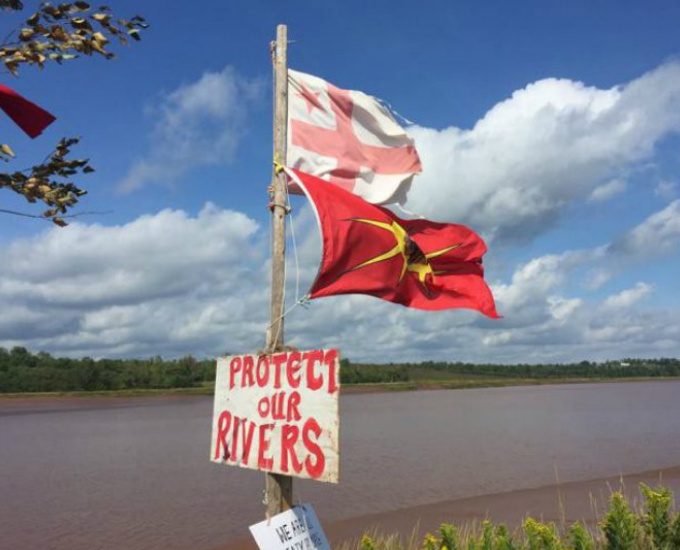
KJIPUKTUK (Halifax) – Alton Gas likes to brag about the soundness of its approach and its willingness to share information with the public.
However, if it weren’t for Rachael Greenland-Smith and Dale Poulette, two stubborn citizen-researchers, we would never have seen evidence that the federal department of Environment and Climate Change (ECC) point blank refused to approve the project as it is currently proposed.
Alton Gas intends to dump 1.3 million cubic metres of salt into the Shubenacadie River over a two- to three-year period. The salt would be flushed out as nearby natural gas storage caverns are being excavated.
Indigenous water protectors and their allies believe that this will harm creatures that live in and around the river and that the Mi’kmaq people who traditionally hunted and fished the area never surrendered the land and were not properly consulted.
Greenland-Smith and Poulette long suspected that there was something amiss with the approval processes, and while learning on the job they started submitting freedom of information requests and piecing the parts of the puzzle together.
What started out as a hunch among the researchers, turned into a reasonable suspicion as documents were being released in response to Freedom of Information requests, and is now an indisputable fact.
The most recent release of documents to the water protectors includes a September 2017 letter from ECC to Alton Gas telling it point blank that the effluent when it first hits the river would be acutely lethal to rainbow trout and as such would contravene the Fisheries Act.
Consider an approach that doesn’t require the dumping of brine into the Shubenacadie River, ECC Assistant Deputy Minister Mike Beale told the company.
“The only viable approach to authorize the deposit of deleterious substances under section 36 of the Fisheries Act for AltaGas appears to be to develop a Governor in Council Regulation. Consequently, AltaGas is advised to seek technological and/or other solutions so that they are no longer depositing a deleterious substance into waters frequented by fish,” writes Beale.
“For example, the company could explore renegotiating its hydrocarbon storage-area lease with the Province of Nova Scotia to allow for removal and trade or sale of the brine or consider methods to prevent fish from frequenting the project’s engineered channel,” Beale writes.
For Greenland-Smith and Poulette the letter exposes how Alton Gas for the last four years or so continued to insist that all was well, despite being told it lacked a workable plan by the very same department that was to approve the project.
For the two researchers it once again illustrates how all parties involved go out of their way to cloak the Alton Gas project in secrecy. So much for building a relationship with stakeholders built on trust, as Alton Gas likes to brag, Poulette says.
“All this happened while Alton Gas boasted that they do this wonderful community liaison work and that they have, in their own words, such great relations with the Mi’kmaq,” says Greenland-Smith.
And that secrecy extends to the province and the federal government, the two researchers say. The very same letter was also part of an earlier Freedom of Information release by the Department of Fisheries, but at that time the relevant paragraphs were all blacked out.
Government secrecy creates an unfair playing field. It shouldn’t be this hard to find out the specifics around a project that affects a community so deeply.
In March 2019 Alton Gas was granted an injunction forcing the two water protectors to abandon their protest camp on the shores of the Shubenacadie River. Poulette wonders if the decision would have been different had the evidence they found been public at that time.
It seems each Freedom of Information release raises new questions.
The 2017 letter from ECC Assistant Deputy Minister Beale is adamant that no change in regulations is being considered. Nonetheless, in 2018 Environment Canada changed its mind and announced that it will develop regulations around brine releases into the Shubenacadie River.
It looks like the file has not moved since that announcement. Without its very own custom-made regulations the Alton Gas project would be doomed, but the mandatory public consultation on the new regulations still has not started.
What’s going on?
Maybe Poulette and Greenland-Smith can find out for us, because it’s a safe bet neither Alton Gas nor the feds will want us to know.
See also: Dale Andrew Poulette and Rachael Greenland-Smith: The fight to save the Shubenacadie River
With a special thanks to our generous donors who make publication of the Nova Scotia Advocate possible.
Subscribe to the Nova Scotia Advocate weekly digest and never miss an article again. It’s free!



